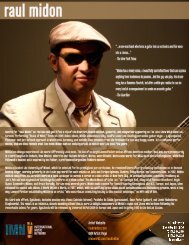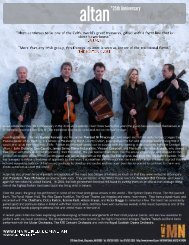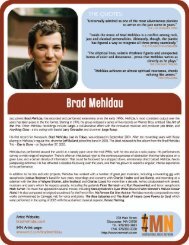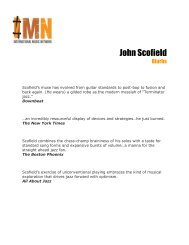Download - International Music Network
Download - International Music Network
Download - International Music Network
- No tags were found...
Create successful ePaper yourself
Turn your PDF publications into a flip-book with our unique Google optimized e-Paper software.
Dobet Gnahoré's music knows no borders - The Boston Globehttp://www.boston.com/news/globe/living/articles/2007/09/07/dobet_gnahors_music_know...Page 1 of 29/7/2007Dobet Gnahoré's music knows no bordersThe singer represents the Pan-African idealBy Andrew Gilbert, Globe Correspondent | September 7, 2007THIS STORY HAS BEEN FORMATTED FOR EASY PRINTINGWhen it comes to politics, the Pan-African ideal has precious little to show for itself in the post-Colonial era.But in the performing arts, the movement seeking to bring together the traditions of various sub-Saharanpeoples has generated brilliant results.Dobet Gnahoré is the quintessential example of an artist whose work blissfully ignores ethnic and nationalboundaries. The product of a bold experiment, the 25-year-old singer, dancer, percussionist, and songwriterfrom the Ivory Coast grew up in a diverse artists' colony where she spoke several languages and mastered themovements and rhythms of a wide array of peoples.Her new album, "Na Afriki," came out in February on the new Cumbancha label and hit the top of the worldmusiccharts last month. She makes her headlining debut in Boston at the Museum of Fine Arts onWednesday as part of a 13-city North American tour.A riveting artist who creates an entire concept for each piece complete with choreography and lighting,Gnahoré is a whirl of motion on stage, her dreadlocks flying as she dances around the bandstand, then sits totap out intricate rhythms on hand percussion. Singing original material in seven languages - including Didaand Guere from the Ivory Coast, Wolof from Senegal, Malinké from Mali, Fon from Benin, Lingala from Congo,and Xhosa from South Africa - Gnahoré possesses a rich, flexible voice that moves easily from a high, puregirlish timbre to a stern, throaty cry. Her lyrics alternate between direct, declarative verses addressing thornysocial issues such as polygamy, family dissolution, and incest, and poetic accounts of love and filial devotion.Working with her husband, French guitarist and composer Colin Laroche de Feline, she doesn't limit herself toAfrican styles. Living in France for the past seven years, she has absorbed sounds from the polyglot scenes inParis and Marseilles, while incorporating influences from her quartet, which features a percussionist from Togoand a Tunisian bassist. It's a concept that flows from her upbringing in Ki-Yi M'Bock, an artists' colony foundedin 1985 by the visionary Cameroonian novelist and painter Werewere Liking, who gathered together acontinental cast of artists, including Gnahoré's father, the master drummer, singer, and actor Boni Gnahoré."In the village we danced the traditional dances of each country from where the members came from, and wesang in different languages," says Gnahoré, speaking in French through a translator from her home in Givet,near the border of Belgium. "When I was 12, I began to sing in Zulu, Malinké, and many traditional languages.I started to play Pygmy music. So this all became part of my Pan-African musical, theatrical, and danceculture. I wanted to continue this in my songs because this is my personality. I didn't really accentuate this onmy first album. But for my second album, 'Na Afriki,' I took the time to work with the translators, to feel it and tolive it throughout the recording."Appropriately enough, Gnahoré made her US debut last fall as part of the Putumayo label's hugely successfulAcoustic Africa tour with Malian guitarist Habib Koité and South African vocalist Vusi Mahlasela. Though shewas the young, unknown artist sharing stages with two of Africa's brightest stars, she made a powerfulimpression with her dynamic performances. "She is so talented in so many different areas," Koité said after aconcert in Berkeley, Calif. "With her voice and dancing, she brings energy for everybody. When she moves,we all feel old."While Putumayo included Gnahoré's "Palea," a gentle, lilting love song in Dida and Arabic, on the "AcousticAfrica" album, "Na Afriki" is her real introduction to US audiences. The fourth release by Cumbancha, the CDis a sumptuous production, with pristine sound, informative liner notes, complete lyric translations in Frenchand English, and gorgeous photos of Gnahoré.
Dobet Gnahoré's music knows no borders - The Boston Globehttp://www.boston.com/news/globe/living/articles/2007/09/07/dobet_gnahors_music_know...Page 2 of 29/7/2007Founded by Jacob Edwards, who did much of the research for Putumayo's international musical anthologies,Cumbancha became his pet project when Putumayo decided to focus on compilations rather than artistdevelopment. Edwards knew he wanted Gnahoré to join his global roster of musicians such as Andy Palacioand the Garifuna Collective from Central America's Caribbean coast, the Idan Raichel Project from Israel, andSka Cubano, a Jamaican/Cuban hybrid from London."She's one of those amazingly charismatic artists," says Edwards from his home in Charlotte, Vt. "I saw herperform for the first time in Holland, and it was incredible, a real Pan-African aesthetic not pegged to oneparticular tradition or culture. Her husband is an amazing story, too. Colin grew up in rural northern France andfell in love with African music. He showed up at her village with a guitar on his back and spent several yearsstudying various styles. When I decided to start my label, she was one of the first artists I set out to sign."© Copyright 2007 The New York Times Company
WORLD MUSIC FESTIVAL REVIEWGnahore won't be a secret for longBy Howard ReichChicago Tribune arts criticSeptember 17, 2007Perhaps a performer who's more charismatic, versatile, dynamic and inventive than DobetGnahore will emerge during the ongoing World <strong>Music</strong> Festival -- but I doubt it. The show thatGnahore played during the opening night of the festival drew ecstatic responses from a sold-outhouse at the Old Town School of Folk <strong>Music</strong> on Friday night, and for good reason.If Gnahore, who's from the Ivory Coast, had done nothing more than wrap that voluptuous,supple, nimble, octaves-leaping voice of hers around her listeners' ears, she would have earnedthe cheers and standing ovations that greeted her work. But she also moved like a dream,expressing the undulating rhythms and buoyant melody lines of her pan-African source materialwith extraordinary physical grace and poetry.Add to that the startling emotional range of her music -- which spans plaintive laments toebullient dance pieces -- and you have a performer who is practically a theater piece unto herself.The seemingly disembodied voice that opened the set, as Gnahore sang offstage, barely hinted atthe experience yet to come. But as Gnahore's beguiling vocals floated through the house, hermelismatic phrases and amber tone quickly seducing the ear, listener curiosity had to be piqued.Soon she took the stage, slowly building the intensity and fervor of her show. By the time thisevening had reached the first of several dramatic peaks -- with Gnahore singing, swaying,chanting, dancing -- an intimate auditorium on North Lincoln Avenue had become a window toAfrican cultures past, present and future. Singing in various African languages, combining ancienttribal dance rituals with 21st Century moves, imploring her audience to sing along with her inchants of daunting complexity, Gnahore seemed to bring the voice of a continent to those luckyenough to have heard her.If there's any justice in this world, she's going to be very, very famous.The Zimbabwe singer-guitarist Louis Mhlanga opened the evening, the quiet humanity of hisvocals dovetailing neatly with the insouciant spirit of his instrumentals. Even so, he was fortunateto open the show, rather than close it, because it cannot be easy for anyone to follow Gnahore.On Saturday night, the geographical focus of the World <strong>Music</strong> Festival shifted to Eastern Europe,with two bands offering 21st Century viewpoints on gypsy music, to varying degrees of success.Surely most listeners attending the sold-out show at the Old Town School would have concurredthat the standout artist was Macedonian clarinetist Ismail Lumanovski, performing with the NewYork Gypsy All-Stars. The phenomenal speed, technical brilliance and musical fluidity ofLumanovski's playing rendered him virtually a Paganini of the gypsy clarinet.The evening's other originally scheduled headliner, Romano Drom, had to cancel, because ofsecurity-clearance issues, "courtesy of the Department of Homeland Security," Old Town Schoolexecutive director James Bau Graves told the crowd.If their replacements, New York-based nouveau-gypsy band Romashka, didn't match thetechnical level of Lumanovski and colleagues, Romashka earned points for high spirits -- and forrushing in to fill the suddenly empty slot.
African singer Dobet Gnahoré tackles social, political issueshttp://sfgate.com/cgi-bin/article.cgi?file=/c/a/2007/09/17/DDMFS185R.DTL&type=printa...Page 1 of 39/17/2007African singer Dobet Gnahoré tackles social, political issuesEric K. Arnold, Special to The ChronicleMonday, September 17, 2007Comparisons to such legendary African female vocalists as Miriam Makeba, Oumou Sangare,Angelique Kidjo and Marie Daulne (of Zap Mama) don't faze Dobet Gnahoré at all. "I am quiteproud to arrive at that level. However, there's a long way to go," says the 24-year-old West Africansinger-songwriter. Speaking through a translator via phone from France, she maintains that suchpraise is "too big to sell to me. I know the place I have."Listen: MP3s: "Ma Pao" | "Yekiki"But, it's an honor for her to be named in such esteemed company, especially because she's spentconsiderable time listening to all of those artists. "I feel like the daughter of Makeba and Kidjo," shesays.With the release of her second solo album, "Na Afriki," and her first coast-to-coast U.S. headliningtour (which lands at the Napa Valley Opera House on Saturday), Gnahoré might be a householdname sooner than she thinks. "Na Afriki" comes alive with lushly arranged polyrhythmic melodies,topped with soaring, emotive vocals. Blending traditional African elements with folk and jazzinfluences, it's a serious contender for world music album of the year."Me and my husband do the music together. All the music was created by both of us," Gnahorésays. "After that, we asked some musicians to be guests. We had the feeling that could be a nicemeeting.""Nice" seems too polite a word for the vibrant range of expression on "Na Afriki." Not only doesGnahoré sing in six languages, but she also covers a broad range of relevant social issues."Djiguene," sung in Wolof, makes a plea for gender equality. "Dala," sung in Dida, urges, "Don'tforget mutual respect, not respect for money, but respect for humans." "Inyembezi Zam," sung inXhosa, questions, "Have we become mad? We pollute the planet." And "Jho Avido," sung in Fon,addresses both mortality and the spirit world: "A thread of light separates the world of the deadfrom that of the living." Another highlight is the requisite love song, "Ma Poo" ("My Breath"), abeautiful ballad sung in Guere and dedicated to Gnahoré's husband and songwriting partner, ColinLaroche de Féline.Though English speakers would never know it from Gnahoré's hauntingly beautiful melodic tones,several songs address politically charged aspects of African society. On "Massacre" and "Pillage,"
African singer Dobet Gnahoré tackles social, political issueshttp://sfgate.com/cgi-bin/article.cgi?file=/c/a/2007/09/17/DDMFS185R.DTL&type=printa...Page 2 of 39/17/2007she takes a stand against genocide and injustice. Two of the strongest statements on "Na Afriki's"are made in "Khabone-N'Daw" and "Mousso Tilou," which address the controversial topics ofincest and polygamy."(As) for the politics, when I meet people or read some incredible story, I feel I have to writesomething on this matter," she says. "It's just instinctive, when I feel some important or someemotional stuff, to write."Discussing taboo topics might seem like an indictment of her native culture, yet Gnahoré alsocelebrates traditional tribal society on "Pygmees," a tune inspired by the forest people of Africa andconsisting entirely of rhythmic vocal chants backed by sparse percussion.In West Africa, a sense of shared culture eclipses national borders and permeates the region'sartistic efforts. For that reason, "Pan-Africanism musically is quite normal," Gnahoré says. Notingthat her mother is from Ghana, she adds, "globally, I feel like an African."Growing up in an artists' commune known as Ki-Yi M'Bock in Abidjan, Ivory Coast, Gnahoré hasbeen immersed in Pan-African culture since the age of 5. Artistic expression became the linguafranca connecting the multigenerational, multinational enclave co-founded by her father, BoniGnahoré, which housed artists from across the continent. In Ki-Yi, dance, theater, poetry and songwere all intrinsically linked, and several languages were commonly spoken."It was really important to be able to meet a lot of artists from all parts of Africa," Dobet Gnahoréexplains. At age 10, she joined a group of young artists within the village who staged their owndance, musical and theater performances, and even made their own costumes. "That was school forme," she says. She learned much, worked hard to discipline herself in the arts and pushed hercreative sensibilities "for music, for dance, for vocation."Gnahoré pays tribute to the village on "Na Afriki's" "Yekiyi." Sung in Malinke, the song credits hersecond family at Ki-Yi with putting the singer on her artistic and musical path. "I found my voice,thanks to you ... I have developed the will to succeed."In 1999, Gnahoré left her homeland and moved to France with her husband and their child,partially because of political instability in the region. "It's really complicated in Ivory Coast," shesays, adding that in Africa, venues and music studios for performing artists are scarce. "It's easierin Europe."Living in Givet, a French town near the Belgian border, Gnahoré and her husband, who learnedAfrican guitar styles while in Abidjan, started composing music. Soon they became affiliated withBelgian management company Contre Jour, whose roster includes a number of African artists.Once again, Gnahoré began to collaborate and create with a collective of artists in the spirit of Ki-Yi, and the result was her debut album, 2004's "Ano Neko." In 2006, she received a BBC World
African singer Dobet Gnahoré tackles social, political issueshttp://sfgate.com/cgi-bin/article.cgi?file=/c/a/2007/09/17/DDMFS185R.DTL&type=printa...Page 3 of 39/17/2007<strong>Music</strong> awards nomination for best newcomer.Gnahoré came to the United States for the first time last year as part of Putumayo's Acoustic Africatour, where she earned rave reviews as the youngest artist on a bill with South Africa's VusiMahlasela and Mali's Habib Koité. Gnahoré admits to being nervous about her first big solo tour,which began in New York on Sept. 10, and ends in Seattle two days after her Napa concert. "Ofcourse I'm a little bit afraid," she says.Gnahoré admits it would be nice to actually become the next big African music star, as some criticshave predicted. "If I become a star, I could help my family and people back home," she says. Andwhile she claims she's somewhat of a perfectionist both onstage and in the studio, she's gettingmore comfortable with the idea of being on the road. "Onstage, it's like theater. I dance. I sing."Dobet Gnahoré: 8 p.m. Sat. Napa Valley Opera House. Tickets: $30-$35. Call (707) 226-7372 orgo to www.napavalleyoperahouse.org.Go to SFGate.com to hear samples of Dobet Gnahoré's music.http://sfgate.com/cgi-bin/article.cgi?f=/c/a/2007/09/17/DDMFS185R.DTLThis article appeared on page E - 1 of the San Francisco Chronicle
Story and photographs by Sean BarlowStrictly Mundial Comes to Montreal:Exceptional performances by Dobet Gnahoré...The biggest revelation was Dobet Gnahoré. In my interview with her before herconcert, Dobet sang a capela with a rich, warm vibrato. Wow! This is one helluvatalented artist. She showed me the sonic and tonal differences between the Fon andBete and Baoule languages. And what poise too. Very sharp with a delightful, friendlypersonality.Dobet told me that as a teenager she had immersed herself in African music, dance,theater and languages at the artist village near the capital Abidjan run by thelegendary Were Were Liking. She performed in their group Ki Yi Mbock that hasplayed the Kennedy Center in DC and other prestigious venues. You could see theresult of this multi-disciplinary, pan-African training on stage at Club Soda in Montrealwhen Dobet Gnaore performed her North American debut. Powerful singing combinedwith a charismatic stage presence, original choreography, and a theatricality thatreminded me of Marie Daulne of Zap Mama. Dobet performed several differenttraditional percussion interests too, backed by a very talented pan-African guitarstylist who also studied with Were Were Liking in Abidjan, a backing singer fromTunisia and a percussionist from France.Dobet Gnahore has one international release, "Ano Neko" on Contre Jour (HabibKoite's label). We look forward to seeing Dobet Gnahoré and her group in the States!
BBC - Awards for World <strong>Music</strong> 2006 - Dobet Gnahore243/08/Thursday 17h49Home TV Radio Talk Where I Live A-Z IndexAccessibility helpText onlyBBC HomepageBBC <strong>Music</strong>Radio 3 HomeRadio Player help16:00 Brian Kay's LightProgrammeScheduleProgrammesPresentersEventsListen AgainClassicalJazzNew <strong>Music</strong>World <strong>Music</strong>Speech & DramaMessageboardsAbout Radio 3Radio 3 HelpBBC PromsBBC PerformingGroupsContact UsLike this page?Send it to a friend!DOBET GNAHORE(IVORY COAST)Listen to NanHave your sayCôte Ivoire used to be knownas a magnet for recordingartists from all over WestAfrica. Many came to use themodern studios in the capitalAbidjan, but ironically, thecountry has never producedmuch in the way of distinctively local vibes, apart from reggaestars Alpha Blondy and Tiken Jah Fakoly. These days it's thevicious and ongoing north/south conflict that garners mostheadlines. The present situation arose as a result of a coup in1999 the same year that 23-year-old singer and songwriterDobet Gnahoré left her homeland and settled in Marseille. Shehas been based there ever since.The thriving multi-cultural music scene of that vibrant Frenchport city provided her with opportunities that were no longeron offer back home, but she has not forgotten her roots. Shemay not have felt safe enough to go back to Côte Ivoire itselfyet, but she has performed in many of the African countriesshe draws inspiration from in her music, visiting Congo,Gabon, Chad and Equatorial Guinea on a recent tour.She!s also keen to stress the importance of her training backhome with the Pan African Ki-Yi Mbock company, based in an'artist village' near Abidjan. There she was taught to take amulti-faceted approach to music, which incorporated song,dance, percussion and theatre. To this day, she sings in sevenAfrican languages as well as French, defining her approach as'defiantly diverse, musically and linguistically'.Her band includes French and Tunisian members as well asher master percussionist father Boni Ngahoré, so the title ofher 2004 debut Ano Neko ('let's create together') seems tofit. Apart from the sounds of Côte Ivoire's Bété and Baoulécultures, you can also hear echoes of Cameroonian bikutsi,Congolese and East African rumba and Manding music plus,of course, reggae in her original songs. Her socially consciouslyrics deal with subjects such as the AIDS pandemic, theimportance of family, village life and remembering your roots.Onstage, Dobet is a vivacious bundle of energy, blessed with apowerful voice and infectious charisma. She wears sumptuousAwards 2006HomepageWelcomeConcert videoNomineesTrack DetailsThe JuryAbout the AwardAudience AwardRelated Linksour partnersSeriousUnion Square <strong>Music</strong>WOMEXfRoots magazineSonglines magazineThe Rough Guide to World<strong>Music</strong>BBC World Serviceon bbc.co.ukWorld RoutesAndy KershawLate JunctionCharlie GillettWorld music CD reviewsR3 Awards 2005R3 Awards 2004R3 Awards 2003R3 Awards 2002on the webBrixton AcademyFlySound of the WorldThe WorldWorld <strong>Music</strong> <strong>Network</strong>World of <strong>Music</strong>Artist profiles and musicAli Farka TouréAli Farka Touré (Album)Amadou & Mariamhttp://www.bbc.co.uk/radio3/worldmusic/a4wm2006/a4wm_dobet.shtmlPage 1 sur 2
BBC - Awards for World <strong>Music</strong> 2006 - Dobet GnahoreAfro-chic outfits, and her hair extensions toss as she swaps aflute for a thumb piano, a shaker or just a pair of dancingshoes.Jon Lusk.Official websiteMore at Global RhythmRead other people's comments thenthink:Tell us what youI heard one of her songs in Putumayo's Women of Africacompilation (Abiani) and the minute I heard her voice, I wasastounded. I then decided to bought her album "Ano Neko"and I was even more astounded. She has an incredibly strongvocal which is projected in each song in the album. I hope Ican see her live in person before I die. Please come to Asia,to our Womad this year in Singapore!Aki Baihaki, SingaporeLove her. Sings with passion and peace in her voice. Haveonly heard "Kakuo" from <strong>Music</strong> From the Chocolate Landsthough. Wish I knew what she was singing about!Peter, TorontoSaw her at Africa Oye in Liverpool. She is brilliant. Listened toher album continuously for 6 weeks until WOMAD andfrequently revisit.Rob - North WalesI saw het in The Netherlands and she is just great! That is allI can say.CharlotteTell us what you think:Your Name and Location:243/08/Thursday 17h49Amadou & MariamAmadou & Mariam (Album)Armenian Navy BandAsha Bhosle & KronosQuartetCarlos VivesCheb i SabbahDaby TouréDhafer YoussefDobet GnahoreDJ ShantelEmmanuel JalEnzo AvitabileFaiz Ali FaizFanfare CiocarliaIlham Al MadfaiKimmo PohjonenKonono No. 1LuraMarizaMercan DedeM.I.A.Nitin SawhneyOmar SosaRachid TahaRy CooderSain ZahoorSalif KeitaSeu JorgeSouad MassiSusheela RamanThione SeckYasmin LevyYat-KhaYour comment:Disclaimer: The BBC will put up as many of your comments as possible but wecannot guarantee that all e-mails will be published. The BBC reserves the rightto edit comments that are publishedBACK TO THE TOPAbout the BBC | Help | Terms of Use | Privacy & Cookies Policyhttp://www.bbc.co.uk/radio3/worldmusic/a4wm2006/a4wm_dobet.shtmlPage 2 sur 2
PLANET BUZZDOBETGNAHORÉsteps into thespotlightSTORY Chris NicksonPHOTOS Dirk LeunisWe’re so familiar with many of the majorAfrican names, from Youssou N’Dour toThomas Mapfumo, it’s easy to forget thata whole other generation is rapidly comingof age behind them. One of the leadingyoung lights is Dobet Gnahoré from theIvory Coast whose recent secondalbum, Na Afriki, marks her not somuch as a talent to watch, but onewho’s already arrived, bearing amasterful slice of Afropop whoseinfluences draw from across thecontinent.From an early age, Gnahoré wasschooled in music, percussion anddance. “I was taught a lot of differentarts and how to express emotions,and that’s helped me a lot,” sherecalls. “I’m used to having everythingmixed into one—music, dance, singing.”One of her primary teachers was herfather, percussionist Boni Gnahoré, whoschooled her extensively in the traditions ofthe Bété people, which you can still hear inher sound. “I was born in a village and grewup in a city,” she says, “so I’ve always beenvery close to my parents and the people inthe village.”Like her father, she began training andperforming in the Ki Yi Mbock company inAbidjan, which offered her grounding andexperience onstage, evident today in herhighly kinetic live performances and naturalcommand of an audience. Additionally, ithelped her pick up a number of Africanlanguages; she currently sings in seven.22 GLOBAL RHYTHM july_07
While working with Ki Yi Mbock, she met Colin Laroche de Féline,a French guitarist, and began working as a dancer with the Tché Tchécompany for a short while. In 1999, as Abidjan was surrounded bythe strife of a coup, the couple moved to France. “It was actuallypurely personal,” Gnahoré insists. “I got pregnant and there wereproblems, so that’s why we moved to Europe. Then we went back,and now I go back and forth a lot.”Laroche and Gnahoré began working and writing music together,touring and performing with others for a couple of years until theirreturn to Africa. A 2001 performance at the illustrious MSA festivalmade people sit up and take notice of her abilities and stagecraft, andthe pair began working with producer Marcellin Yacé, who sadly diedin 2002. Then, in 2003, Gnahoré’s debut, Ano Neko, was released.The album drew from the continent’s full range of sounds, pullingtogether Congolese rumba, pennywhistle jive from South Africa andeven Cameroonian bikutsi all into one package, with lyrics that werevery relevant to contemporary society. “The texts are from Africanreality, all over Africa,” observes Gnahoré. “Traditional music is myinspiration, and I tried to translate the environment and emotions thatsurround it and use it.”Ano Neko got her noticed at home and abroad, and led to extensivetouring, bringing her a nomination as Best Newcomer in the2006 BBC Radio 3 World <strong>Music</strong> awards. She didn’t win, but it raisedher profile even higher, leading to more concerts abroad. “It’s been avery fulfilling experience, getting different elements from everywhereI go and all the people I meet,” says Gnahoré. “It actually helps mewhen I’m writing material and gives me a lot of inspiration.”Now, with Na Afriki fresh on the shelves, she’s really ready to breakout as one of Africa’s new voices. “It’s more of a back to basics albumwith less instruments,” she explains. “There are more languages onthis album, and it’s more to do with the songs. There are more guestson this new one, too.” Once again, the music was a family affair, withher husband playing guitar, and “my father helped me with a lot of thelyrics, and played on three of the songs.” Although there are tracesof soul and even R&B on the disc, Gnahoré argues that, “for me, it’spurely an African album. It’s possible that I listen to soul and R&B, andthere’s plenty of it in Africa, I don’t think it’s there, not from Americansoul, anyway.”The album’s been out in Europe for a little while, and she’s beenpromoting it with shows there. To follow on from that, “I’m actuallypreparing an African tour right now, with some dates in America laterthis year.”But, like most artists, she’s thinking ahead. Na Afriki might just beconsolidating her reputation, but she’s already planning ahead. “I’vebeen thinking about an album that’s even more African, and bringingin even more languages than this one,” says Gnahoré. “It’ll probablyalso be more acoustic, too.”In other words, each release seems to be taking her closer to avery raw African sound. Her voice vaults her out of the crowd, but it’sher mastery of so many different African musical forms (and languages)that really makes her unique. Gnahoré could be the first Africanartist (and certainly the first woman) to speak to her people across thecontinent in their own languages, as well as the next major internationalbreakout, following Miriam Makeba and last month’s cover starAngelique Kidjo, among others.The young generation of African musicians and singers is emerging,building on the work of their elders, but also bringing a broader visionto what they do. And Dobet Gnahoré is at the head of the pack. ·july_07 GLOBAL RHYTHM 23
Na Afriki186/07/Thursday 16h41BillboardWebNews Reviews Hot Product New Releases RIAA Certifications Industry Awards This Day in <strong>Music</strong> Special FeaturesAlbum ReviewsKELLY CLARKSONMy DecemberT.I.T.I. vs. T.I.P.KELLY ROWLANDMs. KellyVELVET REVOLVERLibertadSTRAYLIGHT RUNThe Needles the SpaceQUEENSRýýCHENa AfrikiMindcrime at the DOBET Moore GNAHORÉSingle ReviewsProducer(s): Michel De Bock, FabienLive Reviews PochetGenre: WORLDBook Reviews Label: CumbanchaSave Email Print Most Popular RSS ReprintsIvory Coast native Dobet Gnahoré is not only a sublimevocalist, she's also a notable songwriter. She coauthoredall 15 tunes on the CD with Colin Laroche deFéline, and Gnahoré is a perceptive, frequently criticalobserver of social custom and practice. Titles like "Incest(Khabone-n'daw)," "Pillage," "Massacre" and "Polygamy(Mousso Tilou)" indicate that Gnahoré has a weightyauthorial agenda. Her Pan-African intent is signaled bythe fact that she sings her tunes in Wolof, Xhosa,Malinké, Fon, Lingala, Dida and Guéré, languages ofSenegal, South Africa, Mali, Benin, Congo and the IvoryCoast, respectively. The CD has a contemplative,acoustic feel, though such uptempo interludes as "Dala"and the elemental "Pygmées" offer added textures. —Philip Van VleckAdvertisementSave Email Print Most Popular RSS ReprintsAds by GoogleTop 40 Gratis RingtonesGratis Top 10 Ringtone World <strong>Music</strong>Duizenden Gratis RingtoneGratis beltoon uit de ultratop 10. Huge World <strong>Music</strong> Site. 12k Artists100% Gratis Beltonen - <strong>Download</strong> nu! Kijk, kies en download 'm nu! & 120 Genres-Free Sample <strong>Download</strong>s!be.funmobile.com/BeltonenFixkes.celldorado.comWorld<strong>Music</strong>.NationalGeographic.comAbout Us Contact Us Glossary FAQs Site Map Media Kit Licensing Opportunities Classifieds RSS© 2007 Nielsen Business Media, Inc. All rights reserved.Terms & Conditions Privacy Policyhttp://www.billboard.com/bbcom/content_display/reviews/albums/e3i89c2284e7501ca12764709a6de8584e2Page 1 sur 1
















